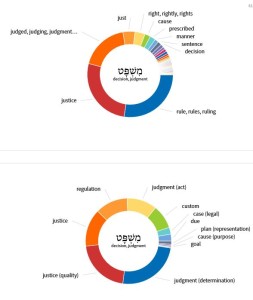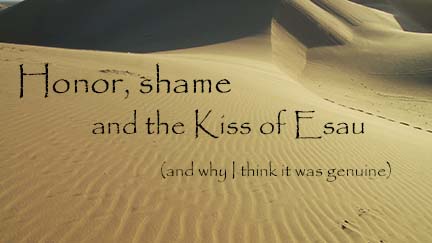 I think we’ve all been driven just about nuts with the misapplication of Matthew 7:1 – I mean, it must be the most maddening verse in all of scripture because it is so readily (and inconsistently) used, it is almost never followed up with the requirements for being a righteous judge, and is even more rarely presented within the honor/shame context of the Sermon on the Mount.
I think we’ve all been driven just about nuts with the misapplication of Matthew 7:1 – I mean, it must be the most maddening verse in all of scripture because it is so readily (and inconsistently) used, it is almost never followed up with the requirements for being a righteous judge, and is even more rarely presented within the honor/shame context of the Sermon on the Mount.
7 “Judge not, that you be not judged. 2 For with the judgment you pronounce you will be judged, and with the measure you use it will be measured to you. 3 Why do you see the speck that is in your brother’s eye, but do not notice the log that is in your own eye? 4 Or how can you say to your brother, ‘Let me take the speck out of your eye,’ when there is the log in your own eye? 5 You hypocrite, first take the log out of your own eye, and then you will see clearly to take the speck out of your brother’s eye.
But before we even get into these verses, what is judgement? Let’s look at the related term – justice:
Pro 21:15 When justice is done, it is a joy to the righteous but terror to evildoers.
 That word “justice” is one of the most important words in scripture, the Hebrew word “mishpat,” so let’s look at it in Logos (thanks so much to the ministry supporters who bought it for me!). As you can see, mishpat is about rendering correct verdicts and is overwhelmingly associated with making sure that the oppressed are correctly judged in legal matters when associated with the corresponding concept of righteousness, or “tzedakah.”
That word “justice” is one of the most important words in scripture, the Hebrew word “mishpat,” so let’s look at it in Logos (thanks so much to the ministry supporters who bought it for me!). As you can see, mishpat is about rendering correct verdicts and is overwhelmingly associated with making sure that the oppressed are correctly judged in legal matters when associated with the corresponding concept of righteousness, or “tzedakah.”
Righteous judgement is always something that we want. People go to court, wanting to be judged – but so often because we have decided that judgment is a negative term we do not see that judgment is very much a double-edged sword. When two people come to court, one is judged righteous and the other unrighteous – in other words, someone is judged to be in the right in this situation and the other person is judged to be in the wrong. Without a proper judgment, we can’t even differentiate between good or bad – there are no good or bad parents, just parents. The parents who molest and burn their children with cigarettes are, without judgement, on par with the parents who work three jobs just trying to put food on the table and get their kids a good education. We want judgment – heck, I want judgment. I want judgement when I am in the right (righteous), most certainly, but also when I am in the wrong (unrighteous) so that I can make corrections. Justice can never be done without judgement. Rapists and child molesters, without judgement, can’t be villified, Hitler becomes just another world leader, and ISIS beheading children can be likened to the Wall Street protesters. Without judgment, they are all equal by definition. One of the greatest commandments throughout scripture is that we rightly judge in the case of the oppressed, widowed, orphaned, foreigner and poor. Compassionate and correct judgement is the lifeblood of the Kingdom.
But people love to say, “Judge not” when someone else holds them accountable for their actions. Now, sometimes we need to keep our judgment to ourselves – we have no right being the endless busybodies of the world, holding non-Covenant people to Covenant standards that they never agreed to live by (as opposed to ourselves, who did agree to live by certain standards). Sometimes, however, Covenant people do need to be held accountable for the actions that bring shame onto our Great God and King – we are no longer our own. ‘Judging’ has become another way of saying ‘disapprove’ – ‘do not judge me’ has become ‘do not disapprove of me.’ In our society, it isn’t even enough anymore to make something horrific, like abortion, legal – we also are being forced to approve of it and people are quick to claim divine backing by inserting Messiah’s out of context quote.
What is Messiah saying here? Yeshua (Jesus) had just spent two chapters judging people and disapproving of their behavior – but in the context of what? The honor/shame culture of the day. I cover this in depth in my family curriculum Honor and Shame in the Bible but I am going to briefly talk about it here.
The ancient world was like judgement central – but not in the way we would automatically think. Well wait, if you’ve ever been on social media or spent the obligatory four years in High School, maybe this will make perfect sense. In a nutshell, men would gather in the public sphere (women in honor/shame cultures are better off at home, believe me!) and pretty much do whatever they could do disrespect each other while still appearing dignified. They would challenge each other in various ways – from doing good deeds simply for the purpose of looking good, praying and fasting in public for the express purpose of looking righteous, to making verbal attacks – sometimes disguised as questions, compliments, or even dinner invitations. Everything done in the public sphere was carefully orchestrated for the sole purpose of gaining respect for oneself and their family by taking it away from some other man and his family – even at the expense of the dignity of the women in the clan (which was one of the biggest reasons they were home, for their own protection – a non-family member often wouldn’t think twice about destroying a woman’s reputation if it meant that he gained prestige over another man).
The Talmudic authors called the first century a time of sinat chinam – gratuitous hatred – and the first century writings cannot be understood without a grasp of the terrible community evils that were being wrought all over the ancient Near East. Almost everything Messiah did publicly fell into the context of these honor challenges as the Judean elites tried everything they could to destroy His honor and get it for themselves. I still haven’t explained “Judge not,” I know – I am getting to it, trust me.
An honor challenge without an audience was nothing more than a private insult, and a private insult was only given to loved ones – someone who you would not want to humiliate publicly. Public insults served two purposes – the humiliation of your enemy, and the elevation of your own honor. Men would gather in the public sphere in order to watch, participate in and judge these honor battles. They would decide who was the most honorable in the challenge based really on who was the most clever – not who was the most decent.
Chapters 5 and 6 of Matthew show Yeshua revealing the Kingdom concepts of honor, literally turning the first century Greco-Roman honor/shame culture on it’s head and commanding His followers not to engage in it – and at the beginning of Chapter 7, He also tells them very plainly not to even sit by and judge those shameful battles either. These men were standing around weighing each other’s value in the balance, judging each other over what amounted to ridiculous schoolyard games for popularity. The previous chapters should have, even before these statements, put them all to shame by showing them how sinful even the most “honorable” of them were on the inside (no one cared about the inside in that culture, only the outside) – that they all had too big of an actual sinful log in their eye to be judging others based on something so shallow as who could verbally outmatch everyone else. The judgments that they were judging with had nothing to do with correcting sin and everything to do with who could be the most insulting, who had the highest rank in society, or who was seemingly the most righteous in appearance. Over and over again, from Genesis to Revelation we are commanded to judge with righteous judgment – but Yeshua wasn’t talking to a society that was practicing that in the public sphere.
In a way, it was as though Yeshua was speaking in a High School auditorium – telling the popular kids that they weren’t really “all that” while admonishing their great unpopular throng of victims to stop playing their hateful games and to see themselves according to God’s idea of what is and is not honorable. In today’s ‘adult’ society, He would probably scold the folks on facebook who are engaging in and encouraging verbal battles between believers, judging based on appearances and reveling in the carnage that serves only to make God look bad – or those who continually try exalt themselves by pulling others down. If you’ve ever been on the pages of some of my co-teachers, you’ve definitely seen the types of people who only drive by when they want to correct and/or harass a well-respected teacher in order gain respect for themselves.
Yeshua’s message? Clean up your own lives (inside and outside) and then, yes then, judge others. Judgement is necessary to survival. Everyone is judgmental – some people are simply more honest about it than others.
Honor/Shame culture is extremely complex and a working knowledge of it is indispensable in understanding the Scriptures from Genesis to Revelation as well as modern day Islamic terrorism. My new fifty lesson course is designed for entire families to explore together in order to get a solid basic handle on honor/shame culture, and gives direction for more in depth study.
All Scripture quotes from The Holy Bible: English Standard Version. (2001)




















